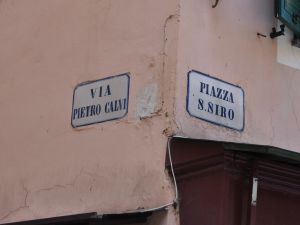Poet and Writer
 He was born in Sanremo on 29 February 1839 from Angelo and Angela Modena.
He was born in Sanremo on 29 February 1839 from Angelo and Angela Modena.
When he was nine years old his family settled in Rome, and here his maternal uncle Don V. Modena, prefect of the Casanatense Library, was able to infuse him with a lively love for classical studies.
He graduated in law at the age of 25 and discovered his literary vocation by writing poetry, articles on history, literature and art in various periodicals. He did not dissimulate his liberal ideas during the pontifical and socialist government after the transition to the Italian one, maintaining, moreover, a serene vision of events.
One of his "Hymn to God", dedicated to A. Aleardi in 1873, pleased the poet who had the C. in his familiarity and had a long correspondence with him.
From that confirmation of his esteem, his literary career increased, all of which took place in the capital, which he loved as a city of adoption and from which he was no longer able to distance himself. Here, in 1874, his first dramatic work, "Caligula or Una farsa imperiale" in 5 acts in verse, was published, with a dedication to cultured readers to whom he offered it as an essay of his own abilities and asked for advice on his future possibilities as a playwright.
On Dec. 4th 1878, the opera in a prologue and 4 acts "Lorhelia" di S. Falchi was performed at the Teatro Argentina, on his own libretto; the first generous approval from the public came, however, on July 14th 1879, at the Teatro Corea, with the drama "Arminio" in 5 acts in verse (there is no lack of effective scenes, such as the monologue of Varo, the verse is often vigorous and sometimes suggestive).
In 1881 he was one of the founders, with P. Bettoli, G. Costetti and others, of the Society of Young Authors, with the aim of providing assistance as well as literature.
The work that revealed it was "Maria di Magdala", in 4 acts and an epilogue in verse, performed on 18 July 1882 at the Costanzi theatre by the Morelli company, protagonist C. Ruta. The Minister of Foreign Affairs, P. S. Mancini, who uprooted the head comedian, revoked at the last moment the prefectural decree of suspension of the performance which, at the sole announcement through the theatre posters, the clerical press had condemned as a desecrator of religion, but which was in fact opposed in "odium auctoris".
The success, to which the attractiveness of the interpreter, the anticlerical shots and the beautiful scenes by A. Bazzani were not unrelated, was good on the first evening and grew beyond expectations in the performances that followed at intervals until 28 August. The Nazarene never appears there, but the dialogue makes us feel his incessant presence (the first example, in C., of that technique "of reflexes" from which he knew how to obtain effects that, even in their elementarity, had great grip on the audience).
The work was forgotten after the death of the author and, after the Costetti, it was remembered only by B. Croce, who observed that the work, undeservedly applauded, resumed the now trite motif of "The Lady of the Camellias", that is, the courtesan of high sentiment who aspires to redemption in love.
She died in Rome on 11th October 1900.
(source: Encyclopaedia Treccani)




